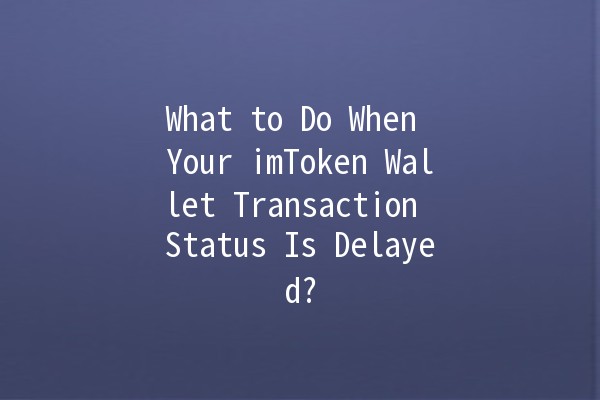In the world of cryptocurrency, transactions can sometimes take longer than expected. If you're using the imToken wallet and facing delays with your transaction status, you're not alone. However, it's essential to know how to handle such situations effectively to minimize frustrations and ensure your digital assets are secure. Below, we will explore practical tips and strategies to manage delayed transactions in your imToken wallet.
Before delving into solutions, it's important to understand why your transaction may be delayed. Several factors can contribute to this, including:

Understanding these factors can help alleviate anxiety about your transactions and provide a clearer perspective on potential solutions.
Before anything else, it's crucial to gauge the current status of the blockchain network you're using. Many blockchain explorers provide visual insights into network congestion and average transaction times. Tools like Etherscan for Ethereum or BscScan for Binance Smart Chain are great places to start.
Example: If you notice that the average block time on Ethereum has increased from 13 to 30 seconds due to congestion, it’s likely that other users are experiencing similar delays.
If you suspect your transaction is delayed due to low gas fees, you can attempt to increase the gas price for the transaction. imToken allows you to adjust the fee when confirming a transaction or even after it's been pending.
Example: If your initial gas price is set at 20 Gwei but the network’s average fee has risen to 50 Gwei, consider adjusting your transaction fee to ensure it's more competitive.
If a transaction has been stuck for too long, you might need to resend it. To do this, you can create a new transaction with the same nonce (unique transaction identifier) but a higher gas fee. This action will allow the second transaction to overwrite the first one.
Example: If Transaction A was sent with a low gas fee, you could resend it as Transaction B with a higher fee, making sure both transactions carry the same nonce.
There are various services known as transaction accelerators that can help speed up pending transactions on certain blockchains, especially Ethereum. These services typically require you to submit your transaction ID for them to assist.
Example: Websites like EtherFlyer provide accelerated transaction services whereby users can submit their transaction hash to expedite the processing.
Regularly check the synchronization of your imToken wallet. If your wallet isn’t fully synced with the blockchain, it may display outdated transaction statuses. You can refresh your wallet or close and reopen the application to ensure that your wallet is in sync.
Realworld application: Consider a scenario where you’ve sent a crypto transaction but the status appears as 'pending.' After refreshing the wallet app, the transaction may display the updated status.
When your transaction is showing as "pending," it's best to check the current gas prices and monitor the network status. If the gas price is low compared to the average, consider increasing it, and if necessary, resend the transaction with a higher fee.
You can check current gas fees on platforms like Etherscan or gas station websites, which provide realtime gas price estimates based on recent transactions.
Unfortunately, you cannot cancel a transaction after it's been broadcast to the network. However, you can send a new transaction with the same nonce and a higher gas fee, which may override the pending transaction.
If your transaction has been pending for more than an hour without any movement, it's advisable to check the network's health. If it's confirmed that there is no congestion, consider resending with a higher gas fee.
While reputable transaction accelerators are generally safe, it's important to use trustworthy services. Be cautious about entering personal details or private keys when using these services.
If a transaction runs out of gas, it will fail. You won’t lose your original funds; instead, the transaction won’t be executed. You’ll need to resend your transaction with an appropriate gas limit that accommodates the complexity of the transaction.
Dealing with delayed transactions in your imToken wallet can be annoying, but understanding the underlying causes and implementing practical strategies can help you find quick solutions. By checking network conditions, adjusting your gas fees, resending transactions, utilizing accelerators, and monitoring wallet synchronization, you can effectively tackle transaction delays. Always stay informed and agile in the dynamic crypto space, ensuring that your transaction processes proceed smoothly and securely.